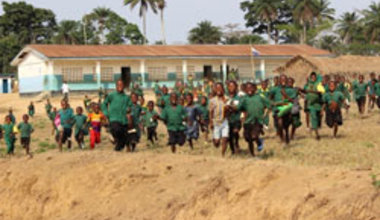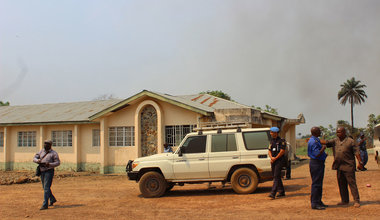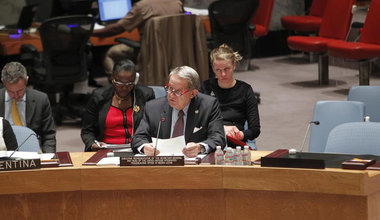UN SECRETARY GENERAL VISIT AFRICA WITH A STOP IN SIERRA LEONE
THE SECRETARY-GENERAL
OPENING REMARKS AT PRESS CONFERENCE
New York, 24 May 2010
SG: Good morning, Ladies and Gentlemen. It is a great pleasure to see you.
As you know, I returned yesterday from Istanbul yesterday afternoon, where I attended the conference on Somalia and had productive bilateral meetings with the Turkish leadership and other world leaders.
This was an important event at a crucial time for Somalia.
The conference expressed its full support for President Sheik Sharif Ahmed and his government's efforts to implement the Djibouti Agreements and keep the peace process on track.
The Istanbul Declaration sent a clear three-fold message:
First, the United Nations will not stand by and watch Somalia struggle alone.
Second, the Transitional Federal Government has to do its part and tackle the hard issues of security and governance.
Third, if we do not tackle the basic causes onshore we will never be able to stop piracy offshore. This entails more training and funding of Somali security forces, and it involves economic reconstruction to break the cycle of despair.
Yesterday's attack on the Presidential palace underscores both the urgency and the scale of the challenge.
Ladies and gentlemen,
The coming weeks will be very busy for all of us.
Here at Headquarters, the NPT review conference concludes on Friday.
As expected, there have been divergent views. Yet the will to succeed has been clear. Many constructive proposals have been put on the table covering all three NPT pillars. Those are: disarmament, non-proliferation and peaceful uses of nuclear energy.
But now we have reached a crucial stage. It is time for an agreement.
I urge delegations to be pragmatic, to abandon rhetoric, and to look beyond narrow national interest. There is too much at stake for the conference to end in failure, as it did last time.
The world is watching. People want a safer world -- a world free of nuclear weapons, a world in which they don't have to worry about nuclear proliferation and nuclear terrorism.
Let me now turn to other topics very much news:
First, the sinking of a Republic of Korea naval ship:
The evidence laid out in the joint international investigation report is overwhelming and deeply troubling. I fully share the widespread condemnation of the incident.
It is particularly deplorable that the incident took place at a time when the Six-Party Talks and international efforts towards a de-nuclearization of the Korean Peninsula remain stalled. Such an unacceptable act by the DPRK runs counter to international efforts to promote peace and stability in the region.
I listened carefully to the announcement made by Republic of Korea President Lee last night. Pursuant to his call for the Security Council to address the matter, close consultations are expected to take place among key members of the Council. I am confident that the Council, in fulfilling its responsibility for the maintenance of international peace and security, will take measures appropriate to the gravity of the situation.
This incident is a stark reminder of the urgency of securing peace and stability on the Korean peninsula. I do hope that the Council's prompt action will also contribute to the early resumption of the Six Party Talks to address nuclear issues and other outstanding concerns.
Finally, given the severity of the humanitarian situation in the DPRK, the United Nations will continue its life-supporting work for those in dire need. In this regard, I commend the announcement by President Lee that the Republic of Korea Government will continue humanitarian assistance to vulnerable children.
As Secretary-General of the United Nations, I will continue to closely follow developments.
Concerning Iran:
In Istanbul, I told Prime Minister Erdogan of Turkey, that I welcomed Turkey's diplomatic efforts to help resolve international tensions over Iran's nuclear programme, undertaken in tandem with Brazil. Last week I spoke by phone with Brazil's Foreign Minister, and I will meet President Lula in person later this week in Rio de Janeiro.
As you know, today Iran handed a letter to the International Atomic Energy Agency. The proposal will now be assessed by the IAEA and other concerned parties. This morning, I had telephone discussions with Mr. [Yukiya] Amano, Director General of the IAEA. If accepted and implemented, it could serve as an important confidence-building measure and open the door for a negotiated solution to the Iranian nuclear issue.
I have stated repeatedly that Iran should show greater transparency about its nuclear programme. Let me stress once again the importance of Iran's full cooperation with the IAEA and full compliance with relevant Security Council resolutions.
Ladies and Gentlemen,
Looking ahead, I have a month of heavy travelling.
I will be in Brazil later this week for the Third Forum of the Alliance of Civilizations.
Support for the Alliance keeps growing. The number of countries now exceeds 100. The United States just became the latest to join. Such bridge-building work -- across cultures, religions and traditions -- is critical to so many of our global challenges.
From there I go to Malawi, where I will address parliament and meet with President Bingu wa Mutarika, the current President of the African Union.
I will also visit a Millennium Village -- a case study in a basic truth about the Millennium Development Goals: Where we try, we succeed. When we don't try, we fail.
On May 31st, in Kampala, Uganda, I will convene the first review conference of the International Criminal Court.
We have come a long way. A decade ago, few would have believed that the International Criminal Court would now be fully operational, investigating and trying perpetrators of genocide, war crimes and crimes against humanity across a growing geography of countries.
The Kampala review conference is an important opportunity, not only to take stock of our progress, but to strengthen our collective determination that international crimes cannot go unpunished.
How else are we to deter them in the future?
The era of impunity must end. We are entering a new age of accountability.
I will end my trip with the Africa-France Summit in Nice, at President Sarkozy's invitation. I plan to use the occasion to meet with many African leaders and take part in an important session on climate change and development.
Later in June, I will return to Africa twice more.
First, I will travel to South Africa to discuss the Millennium Development Goals and enlist support for the September Summit. But of course my trip coincides with the opening of the World Cup -- a fabulous tribute to Africa's prowess and potential.
From there I will visit Burundi as well as several West African countries where the United Nations has wide-ranging activities: Cameroon, Nigeria, Benin and Sierra Leone.
At the end of June, I will visit Gabon and the Democratic Republic of the Congo. MONUC is at a crucial stage of its work, and I want to personally engage with the country's leaders on the important matters at stake.
Thank you very much. I will be happy to answer some of your questions.
 UN
UN




